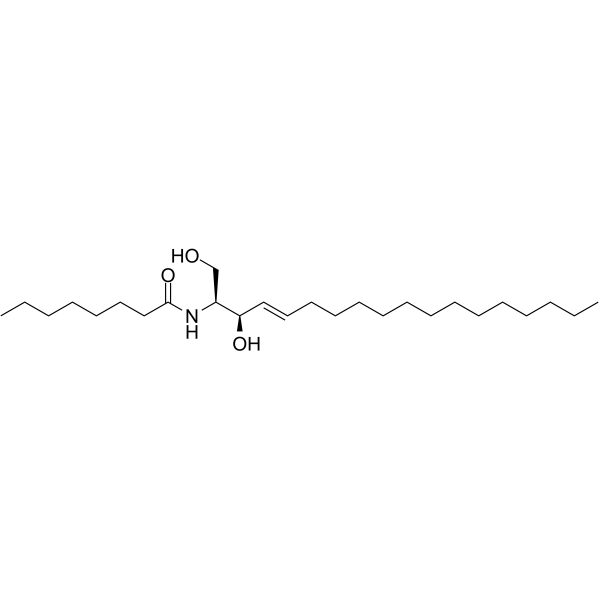上海金畔生物科技有限公司为生命科学和医药研发人员提供生物活性分子抑制剂、激动剂、特异性抑制剂、化合物库、重组蛋白,专注于信号通路和疾病研究领域。
C8-Ceramide (Synonyms: N-辛酰基-D-神经鞘氨醇; N-Octanoyl-D-erythro-sphingosine) 纯度: ≥98.0%
C8-Ceramide (N-Octanoyl-D-erythro-sphingosine) 是一种细胞渗透性的内源性神经酰胺类似物。C8-Ceramide 具有具有抗增殖特性,能作为化疗试剂。C8-Ceramide 能刺激树突状细胞促进 T 细胞对病毒感染的反应。C8-Ceramide 在体外能轻微地诱导 PKC 活化。

C8-Ceramide Chemical Structure
CAS No. : 74713-59-0
| 规格 | 价格 | 是否有货 | 数量 |
|---|---|---|---|
| 5 mg | ¥2950 | In-stock | |
| 10 mg | 询价 | ||
| 50 mg | 询价 |
* Please select Quantity before adding items.
C8-Ceramide 相关产品
•相关化合物库:
- Bioactive Compound Library Plus
- Apoptosis Compound Library
- Epigenetics Compound Library
- Immunology/Inflammation Compound Library
- Kinase Inhibitor Library
- TGF-beta/Smad Compound Library
- Anti-Cancer Compound Library
- Autophagy Compound Library
- Oxygen Sensing Compound Library
- Cytoskeleton Compound Library
- Anti-Lung Cancer Compound Library
| 生物活性 |
C8-Ceramide (N-Octanoyl-D-erythro-sphingosine) is a cell-permeable analog of naturally occurring ceramides. C8-Ceramide has anti-proliferation properties and acts as a potent chemotherapeutic agent. C8-Ceramide stimulates dendritic cells to promote T cell responses upon virus infections. C8-Ceramide induces slight activation of protein kinase (PKC) in vitro[1][2][3][4]. |
||||||||||||||||||||||||||||||||
|---|---|---|---|---|---|---|---|---|---|---|---|---|---|---|---|---|---|---|---|---|---|---|---|---|---|---|---|---|---|---|---|---|---|
| IC50 & Target[2][4][5] |
|
||||||||||||||||||||||||||||||||
| 体外研究 (In Vitro) |
C8-ceramide (3 μM; 48 hours) irreversibly reduces tumor-cell proliferation and induces morphological changes[1]. Shanghai Jinpan Biotech Co Ltd has not independently confirmed the accuracy of these methods. They are for reference only. Cell Viability Assay[1]
Cell Proliferation Assay[2]
Cell Cycle Analysis[2]
Apoptosis Analysis[2]
|
||||||||||||||||||||||||||||||||
| 体内研究 (In Vivo) |
C8-ceramide (0.1 mg/kg; intranasal administration) induces more robust CD8+ and CD4+ T cell responses to viral infections in virus infected mice[3]. Shanghai Jinpan Biotech Co Ltd has not independently confirmed the accuracy of these methods. They are for reference only.
|
||||||||||||||||||||||||||||||||
| 分子量 |
425.69 |
||||||||||||||||||||||||||||||||
| Formula |
C26H51NO3 |
||||||||||||||||||||||||||||||||
| CAS 号 |
74713-59-0 |
||||||||||||||||||||||||||||||||
| 中文名称 |
N-辛酰基-D-神经鞘氨醇 |
||||||||||||||||||||||||||||||||
| 运输条件 |
Room temperature in continental US; may vary elsewhere. |
||||||||||||||||||||||||||||||||
| 储存方式 |
-20°C, stored under nitrogen *In solvent : -80°C, 6 months; -20°C, 1 month (stored under nitrogen) |
||||||||||||||||||||||||||||||||
| 参考文献 |
|
所有产品仅用作科学研究或药证申报,我们不为任何个人用途提供产品和服务
